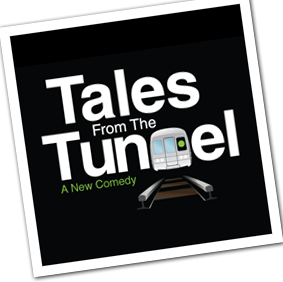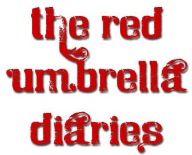Some venues I’ve come across recently that either offer collections of topic-specific stories or serve as collection points for stories — or both:
-
- Glamour magazine runs an annual contest to find the best real-life story submission. I’ve read a lot of the past winning stories, and they are quite compelling (Read last year’s winning story of surviving sexual abuse.)
-
- Tales from the Tunnel is a play in New York City in which (as
 reported by Andrew Grossman in the Wall Street Journal, six actors perform 100 very short stories, ranging in duration from 20 seconds to seven minutes, that the playwrights collected from friends, family, and people whom they met on the subway during the last three years. “The stories are mostly light — and occasionally heavy — takes on the strange interactions that arise from being stuck in a long metal box with strangers,” Grossman reports. “One character tells of the time he gave a Tic-Tac to a hypoglycemic man suffering from low blood sugar.”
reported by Andrew Grossman in the Wall Street Journal, six actors perform 100 very short stories, ranging in duration from 20 seconds to seven minutes, that the playwrights collected from friends, family, and people whom they met on the subway during the last three years. “The stories are mostly light — and occasionally heavy — takes on the strange interactions that arise from being stuck in a long metal box with strangers,” Grossman reports. “One character tells of the time he gave a Tic-Tac to a hypoglycemic man suffering from low blood sugar.” - GDP — Measuring the human side of the Canadian economic crisis, from the National Film Board of Canada, is Canada’s “first bilingual web documentary, a pan-Canadian project that bears witness to the far-reaching effects of the crisis in our lives and communities.” You can see the stories here.
- Tales from the Tunnel is a play in New York City in which (as
-
 PenTales was created in NYC by two childhood friends passionate about connecting people through stories. The friends “instigate story experiments and experiences around the world, including storytelling events.” They “believe that everyone has a great story to tell, that telling and listening to stories connects people in meaningful ways, and that getting people together in real spaces to share real experiences can produce powerful creative connections.”
PenTales was created in NYC by two childhood friends passionate about connecting people through stories. The friends “instigate story experiments and experiences around the world, including storytelling events.” They “believe that everyone has a great story to tell, that telling and listening to stories connects people in meaningful ways, and that getting people together in real spaces to share real experiences can produce powerful creative connections.”- Story of Stuff creator Annie Leonard is back with The Story of Cosmetics. The Story of Stuff Project’s intent is to leverage and extend the impact of the first film in the series, The Story of Stuff. “We amplify public discourse on a series of environmental, social and economic concerns and facilitate the growing Story of Stuff community’s involvement in strategic efforts to build a more sustainable and just world,” the site says. Other films in the series include The Story of Bottled Water and The Story of Cap and Trade. Just released last week is The Story of Electronics.
- The White House Project, a national, nonpartisan, not-for-profit organization, “aims to advance women’s leadership in all communities and sectors, up to the U.S. presidency. By filling the leadership pipeline with a richly diverse, critical mass of women, [the project] make[s] American institutions, businesses and government truly representative.” Part of the project is telling the stories of women leaders.
- The Storytellers Project by New Roots for Refugees helps refugees tell their stories of resettlement.
- During its recent two-week vacation, TEDTalks published “playlists” from among the 700+ presentations in the TED series. First up was a playlist of Life Stories, including Ben Dunlap’s “tale of a grand life, lived with passion, principle and humor,” Stefan Sagmeister’s learnings from his life so far, Deborah Scranton facilitation of three soldiers telling their own stories of conflict in Iraq in her powerful “War Tapes,” and A.J. Jacobs’s tale about about his year of living Biblically
- My Days is a collection of stories from 25 elderly Norwegian men and women between 79 and 104 years old from their everyday lives. Filmmakers Hanne Jones and Eli Lea from the Norwegian film production company Flimmer Film went from door to door in old people’s homes in Bergen collecting stories from the residents lives. The stories were recorded, edited and vizualised with photographs from the storytellers personal photo albums.
- Neiman Storyboard publishes a collection of what they call Notable Narratives, outstanding examples of narrative journalism drawn from newspapers, magazines, radio and television.
- On Small Biz Stories, small-business enthusiasts can connect by sharing experiences. The site publishes the stories of entrepreneurs at least once a month.
-
- The Red Umbrella Project is founded on the belief that
 storytelling is a building block of movement-building and solidarity. (The red umbrella is a symbol of international sex worker solidarity.) “People who have spent time in the sex industries know all too well the social and legal stigmas that prevent us from being treated with the dignity and respect we deserve,” the site says. “While researchers, the media, and myriad others fill up page after page with stories about the sex trade, the voices of people who have lived this reality are consistently denied and erased. Everyone has a story, and the people who are best equipped to tell the stories of people in the sex trade are the people who have personal experiences in the industry.”
storytelling is a building block of movement-building and solidarity. (The red umbrella is a symbol of international sex worker solidarity.) “People who have spent time in the sex industries know all too well the social and legal stigmas that prevent us from being treated with the dignity and respect we deserve,” the site says. “While researchers, the media, and myriad others fill up page after page with stories about the sex trade, the voices of people who have lived this reality are consistently denied and erased. Everyone has a story, and the people who are best equipped to tell the stories of people in the sex trade are the people who have personal experiences in the industry.” - The host of 100 Word Stories, who seems to go by “Mr. Crap,” says that 100-word stories, commonly known as the Drabble, “are an extremely brief form of flash-fiction. … Every Sunday, a new Weekly Challenge will be posted.” Mr. Crap continues: “I’ll offer up a topic or theme which you will use as the inspiration to write and record your own 100-word story. Then, send them to me via email so I can include them in a podcasted collection for all to enjoy.”
- The Red Umbrella Project is founded on the belief that
-
 Recognize a Leader is not s storytelling site per se, but the author behind it, Steve Denning, is an organizational storytelling pioneer whose new book, The Leader’s Guide to Radical Management, was recently released. Visitors to the site have the opportunity to recognize leaders by writing them a note. None of the notes I saw were especially storied, but there’s no reason visitors can’t tell stories to support their leader recognitions.
Recognize a Leader is not s storytelling site per se, but the author behind it, Steve Denning, is an organizational storytelling pioneer whose new book, The Leader’s Guide to Radical Management, was recently released. Visitors to the site have the opportunity to recognize leaders by writing them a note. None of the notes I saw were especially storied, but there’s no reason visitors can’t tell stories to support their leader recognitions.- The Purple Couch “is on a quest throughout America’s “living room” (anywhere the couch lands) seeking to be a platform for the truth about what matters, a platform for the people to speak and be heard. We believe that there is power in our stories — the power that comes with understanding. And, when it finally dawns on us that we have much in more common than that which sets us apart, we will begin to heal as a country and a planet.”
-
- Mortified “is a comic excavation of the strange and extraordinary
 things we created as kids. Witness adults telling stories about their lives by sharing their own adolescent journals, letters, poems, lyrics, plays, home movies, and art. After all, where else can you hear grown men and women confront their past with firsthand tales of their… first kiss, first puff, worst prom, fights with mom, life at bible camp, worst hand job, best mall job, and reasons they deserved to marry Jon Bon Jovi.”
things we created as kids. Witness adults telling stories about their lives by sharing their own adolescent journals, letters, poems, lyrics, plays, home movies, and art. After all, where else can you hear grown men and women confront their past with firsthand tales of their… first kiss, first puff, worst prom, fights with mom, life at bible camp, worst hand job, best mall job, and reasons they deserved to marry Jon Bon Jovi.”
- Mortified “is a comic excavation of the strange and extraordinary
 In mid-2009, The Inspire Foundation launched the #Manweek campaign to raise awareness of issues such as the fact that in Australia, young men commit suicide at more than three times the rate of women of the same age and mental illness and drug and alcohol dependency is severely affecting men aged 16-24. A number of Australian bloggers supported this campaign, sharing their thoughts, challenges, and experiences with their readers. As the campaign ended, the organizers felt that the campaign had only just scratched the surface; they wanted to take these stories and share them with others – with brothers, fathers and uncles. The book The Perfect Gift For a Man
In mid-2009, The Inspire Foundation launched the #Manweek campaign to raise awareness of issues such as the fact that in Australia, young men commit suicide at more than three times the rate of women of the same age and mental illness and drug and alcohol dependency is severely affecting men aged 16-24. A number of Australian bloggers supported this campaign, sharing their thoughts, challenges, and experiences with their readers. As the campaign ended, the organizers felt that the campaign had only just scratched the surface; they wanted to take these stories and share them with others – with brothers, fathers and uncles. The book The Perfect Gift For a Man
30 Stories About Reinventing Manhood is the result. All proceeds go to The Inspire Foundation.
